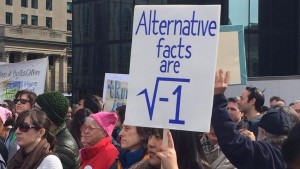Trump and Science

Here’s a question for your consideration: When you hear the president interviewed on “60 Minutes” telling Leslie Stahl that climate change may reverse itself naturally and that there is no proof that human activity is causing temperatures to rise, do you believe that he sincerely believes that?
What do you find most probable? Donald Trump:
a) Was never told about the scientific consensus on the subject?
b) Is aware of the scientific consensus, but doesn’t believe it’s true, because of his superior understanding of the subject?
c) Believes the scientists, but claims otherwise, because this is an important aspect of playing to his base?
If you think it’s a) or b), you just may have what it takes to be a Trump supporter.

Craig,
I understand the potetnial implications and fears the scientists express in opposition to politicization of scientific process, but the administration would argue that situation has already occurred under the Obama administration to the point where the responsible elected officials became partisan collaborators for partisan scientists.
I have just two questions for you;
1) Where in the US Constitution is control of government money and responsibility for policy removed from elected officials and placed under the control of un-elected “scientists” ?
2) Could you please explain, or define, what you mean when you use the term “scientific consensus” ?